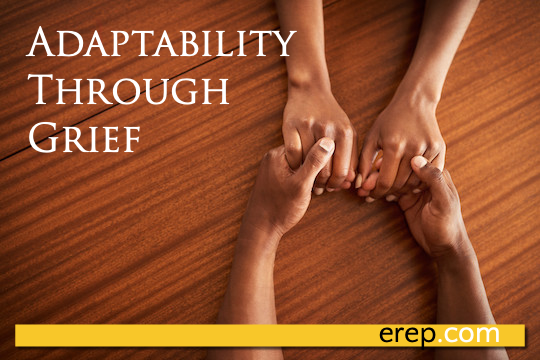Adaptability Through Grief
- By
- Valentina Hynes, Contributor
- Posted
- Monday, March 6, 2023

Life is a journey, and journeys are unpredictable. Sometimes smooth, sometimes bumpy, sometimes full of unexpected detours and occurrences.
When you embark on a journey, you put measures in place to ensure your safety, survival and comfort because the unexpected can happen. Your tire could unexpectedly deflate, an accident could occur, a vehicle could break down or transport services could be delayed, you may suddenly take ill, or your battery could die.
It is the same with life, career and relationships. We do what we can to plan and prepare, but the key to surviving is to always expect the unexpected. Like being made redundant, getting ill, losing a loved one, falling in love, or even getting a promotion or a salary cut.
Expecting the unexpected is developing adaptability.
Adaptability is often used interchangeably with resilience. However, adaptability actually builds resilience over time.
Adaptability is being able to adjust to new and changing conditions, while resilience is the capacity to withstand or recover from those challenges.
How Do We Build Adaptability?
When unexpected negative life events occur, it can throw us a curveball. It can challenge our wellbeing and mental health. This can also happen with positive life events, too. Change is the common factor and we all react differently to change depending on the resources we have.
Self Reflection
A Nigerian proverb says "A person who has one finger pointing at another has three pointing towards themself."
The ability to self reflect is a beneficial skill to develop. Challenging our perception helps us unearth biases and limiting beliefs. It helps us look at the bigger picture and make necessary adjustments.
Self reflection helps us build and strengthen our emotional intelligence.
The art of self reflection can be developed through journaling and meditation.
Intentionality
Being intentional is being purposeful. Purpose is found in planning and action and execution. We ask ourselves what needs changing, what needs strengthening, and what needs to be built up? How do you implement it and ensure consistencey?
In conversation workshops I host, when we explore the theme of Intentionality, the following always come up as ways to build intentionality and happiness:
- Gratitude
- Connection and reconnection through conversations
- Self-care
- Observation and mindfulness
Learning
Every day is a school day. Despite the adage that you can't teach an old dog new tricks, we are seeing that with technological advancements and the global village that the world is becoming, we learn new information and discover new and more effective ways of doing things we thought we already knew.
Learning something new boosts our confidence by releasing serotonin and oxytocin. It improves our adaptability and increases our chances of survival.
Learning should be a mix of structured and unstructured practices for maximum effectiveness. This includes conventional education, upskilling, Continuing Professional Development (CPD) opportunities, conversational encounters, entertainment, and self reflection.
Adapting Through Grief
Grief is a complex set of emotions that occur in different phases. There's no rulebook for grief. We mostly wing it, because we each experience, react and handle it differently. Grief challenges us. Grief makes us question our existence, our relationships, and our encounters. It changes us.
The changes grief puts us through can be sudden and expected.
Coping with grief is especially difficult if we focus on the destination — When do we begin to feel better? When will it stop hurting?
'When questions' make us focus on an expectation rather than on the journey. Healing is a journey, and as with most journeys there may be unexpected turns, delays, detours, and encounters.
Some days, some moments, you'll forget and then it will hit you. Sometimes you'll feel your heart race for no reason. Sometimes you'll find yourself randomly bursting into tears or experiencing sudden intense anger.
Even as we grieve, healing takes place. Healing begins the moment of loss, like getting a cut and our blood begins to clot to prevent further bleeding. Our actions during grieving and the support we receive are vital for the continuation of good healing with as little emotional scarring as possible.
Depending on your personality or behavioral preferences, your social reaction to grief may be to self-isolate or distract yourself with people, parties, noise.
Whatever your coping mechanism may be, it is vital that you reach out, accept, and pursue a support network that understands you and what you're going through. If you're supporting someone who is grieving, it is important to let empathy lead you so that compassion can step in.
Go to eRep.com/core-values-index/ to learn more about the CVI or to take the Core Values Index assessment.

Valentina Hynes
Contributor
Valentina is an author and award winning serial entrepreneur who has launched several successful businesses, starting in Nigeria to Côte d’Ivoire and now in the UK where she co-founded SVH CIC, and serves in the capacity of Mental Health First Aid Instructor, Workshop and Away Day Facilitator and Professional Speaker. She was appointed an Associate Fellow of The Royal Commonwealth Society UK in 2014 for her philanthropy and drive for well-being, happiness and inclusion.
View additional articles by this contributor
Essentials
Additional Reading
Stay Updated
Employer Account Sign-up
Sign up for an employer account and get these features and functions right away:
- Unlimited Job Listings on eRep.com
- Applicant Search
- Applicant Tracking System (ATS)
- Unlimited Happiness Index employee surveys
- 3 full/comprehensive CVIs™
- No credit card required — no long-term commitment — cancel at any time
